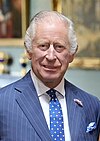Baron Greenwich
| Baron Greenwich | |
|---|---|
 Arms of Charles, Prince of Wales, before his accession | |
| Creation date | 20 November 1947 |
| Creation | Second |
| Created by | George VI |
| Peerage | Peerage of the United Kingdom |
| First holder | Philip, Duke of Edinburgh |
| Last holder | Charles, Prince of Wales[1] |
| Remainder to | the 1st Baron's heirs male of the body lawfully begotten |
| Status | Merged with crown |
| Extinction date | 8 September 2022 |
| Former seat(s) | Clarence House |
Baron Greenwich was a title in the Peerage of the United Kingdom that has been created twice in British history.
History
[edit]Prior to the title's first creation in the Peerage of Great Britain in 1767, King Charles II of England planned to create the title "Countess of Greenwich" for Nell Gwyn, one of his low-born mistresses. This was to follow Charles II bestowing the titles of Duchess of Cleveland, Countess of Castlemaine, Baroness Limerick, and Baroness Nonsuch upon his other mistress, Barbara Palmer; the title of Viscountess Shannon upon his first mistress, Elizabeth Killigrew; and the titles of Duchess of Portsmouth, Duchess of Aubigny, Countess of Fareham, and Baroness Petersfield to yet another mistress, Louise de Kérouaille.
However, Charles died on 6 February 1685, having never followed through on his original plans to ennoble Gwyn.[2]
The first official creation came in the Peerage of Great Britain in 1767, when Lady Caroline Townshend was made Baroness Greenwich, in the County of Kent, with remainder to the male issue by her second husband, Charles Townshend. She was the daughter of Field Marshal The 2nd Duke of Argyll, who had been created Earl of Greenwich in 1715 and Duke of Greenwich in 1719, titles which became extinct on his death in 1743. As Caroline's two sons by her second husband predeceased her, the title became extinct upon her death in 1794.
The second creation came in the Peerage of the United Kingdom in 1947 when Lieutenant Philip Mountbatten, on the morning of his wedding to Princess Elizabeth (who became Queen Elizabeth II), was made Baron Greenwich, of Greenwich in the County of London. He was made Duke of Edinburgh and Earl of Merioneth at the same time.[3] Prince Philip died in 2021, and the title passed to his son Prince Charles, until it merged with the crown when Charles became King in 2022.
Baronesses Greenwich; First creation (1767)
[edit]
- Caroline Townshend, 1st Baroness Greenwich (1717–1794)
Barons Greenwich; Second creation (1947)
[edit]
| Earl | Portrait | Birth | Marriage(s) | Death |
|---|---|---|---|---|
| Prince Philip Mountbatten 1947–2021 also: Duke of Edinburgh and Earl of Merioneth (1947) |

|
10 June 1921 Mon Repos, Corfu son of Prince Andrew of Greece and Denmark and Princess Alice of Battenberg |
Princess Elizabeth 20 November 1947 4 children |
9 April 2021 Windsor Castle, Windsor aged 99 |
| Prince Charles[1] House of Windsor 2021–2022 also: Prince of Wales and Earl of Chester (1958), Duke of Cornwall, Duke of Rothesay (1952), Duke of Edinburgh and Earl of Merioneth (2021) |

|
14 November 1948 Buckingham Palace, London son of Prince Philip and Queen Elizabeth II |
Lady Diana Spencer 29 July 1981 – 28 August 1996 2 children Camilla Parker Bowles 9 April 2005 |
– now 75 years, 364 days old |
| Prince Charles succeeded as Charles III in 2022 upon his mother's death, and his hereditary titles merged in the Crown. | ||||
References
[edit]- ^ a b "HRH The Duke of Edinburgh". College of Arms. 9 April 2021. Archived from the original on 11 April 2021. Retrieved 9 April 2021.
- ^ Hilliam, David (1 November 2009). Monarchs, Murders & Mistresses: A Book of Royal Days. The History Press. ISBN 978-0752452357.
- ^ "No. 38128". The London Gazette. 21 November 1947. pp. 5495–5496.
Other information
[edit]- Barons Greenwich
- Extinct baronies in the Peerage of the United Kingdom
- Prince Philip, Duke of Edinburgh
- 1767 establishments in Great Britain
- Noble titles created in 1947
- Noble titles created in 1767
- Peerages created with special remainders
- British and Irish peerages which merged in the Crown
- 1947 establishments in the United Kingdom
- 2022 disestablishments in the United Kingdom
- Charles III
